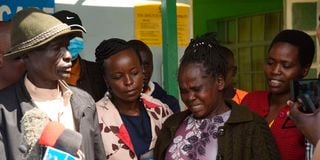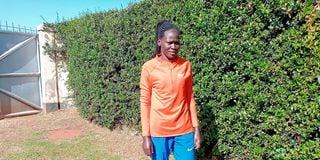When home is no longer safe: The unending horror of intimate partner violence among athletes

Dead Ugandan athlete Rebecca Cheptegei's parents, Joseph Cheptegei (left) and Agnes Cheptegei (right) address a press conference alongside relatives at the Moi Teaching and Referral Hospital in Eldoret City, Uasin Gishu County, on September 5, 2024.
What you need to know:
- Early this week, Uganda's Olympic athlete Rebecca Cheptegei was rushed to hospital after being doused with petrol and set on fire by her estranged partner.
- On Thursday, Rebecca died at Moi Teaching and Referral Hospital, Eldoret, where she was admitted to the ICU. She had sustained 80 per cent burn injuries.
Early this week, Kenyans received news that Olympic athlete Rebecca Cheptegei had been rushed to hospital after being doused with petrol and set on fire by her estranged partner.
The 33-year-old Ugandan marathoner, who competed in the recent Paris Olympics, had suffered extensive burns after Sunday's attack.
On Thursday, Rebecca died at Moi Teaching and Referral Hospital, Eldoret, where she was admitted to the ICU. She had sustained 80 per cent burn injuries. The burns damaged most of her organs.

Ugandan marathon runner Rebecca Cheptegei at the Rosa Associati Camp in Kapchorwa, Uganda on January 19, 2023.
The suspected boyfriend also sustained about 30 per cent burns during the attack and was admitted to the same facility.
Joseph Cheptegei, Rebecca’s father, urged the Kenyan government to ensure justice is served. “We have lost our breadwinner,” he said, wondering how her two young children would “proceed with their education”.
He claimed that a piece of land at Endebess in Trans Nzoia was the source of the conflict between the pair.
Cases of intimate partner violence among athletes have been on the rise in the last few years, with female athletes the most affected.
In October 2021, Kenya’s long-distance runner Agnes Tirop, a two-time world championship bronze medallist, was found dead at her home in Iten. She was 25. Agnes was allegedly stabbed by her husband.
The husband, Ibrahim Rotich, was charged in November 2021 with the murder. Agnes’ body had a stab wound. Rotich, however, denied the charges. The High Court in Eldoret later released him on Sh400,000 bond, with surety of a similar amount, or a Sh500,000 bail.
In April 2022, Damaris Muthee Mutua was also murdered in Iten, allegedly by her Ethiopian boyfriend. Her body was found in a house in Iten, a popular training base for long-distance runners. Police said her Ethiopian boyfriend was a suspect after he allegedly confessed to the killing. By the time of her murder, Damaris was running for Bahrain.
Fellow athletes alerted the police after the killer called, saying he had committed the murder. A postmortem showed she was strangled. The suspect was said to have fled with her documents, including ID card and bank documents.
Following Rebecca’s death, the government has now waded into the matter and promised to stop similar incidents. Youth Affairs and Sports Cabinet Secretary Kipchumba Murkomen on Thursday said the death is a reminder that more effort is needed to end gender-based violence (GBV).
“This tragedy is a stark reminder that we must do more to combat gender-based violence in our society, which, in recent years, has reared its ugly head in elite sporting circles. As a government, we remain committed to supporting justice for Rebecca. No one should have to go through such an ordeal.”
During his vetting, Mr Murkomen committed to enacting laws and policies that protect sportswomen from violence at the hands of their male colleagues or partners. Responding to a question by Samburu West MP Naisula Lesuuda on whether the ministry has a gender violence and abuse policy, he said greedy vultures that target talented women for wealth, perpetrate sexual and gender-based violence.
“I know world-class athletes who hold world-class records, and as a senator, I had to assist them in calling the DCI (Directorate of Criminal Investigations) to protect them from attacks by pests who pose as husbands. Once they see potential, they present themselves as suitors, pretend to be in a marriage, prey on them, and steal their wealth.”
Three-time London marathon champion Mary Keitany, who accompanied Damaris's family to Iten after her murder, decried the rising cases of GBV among athletes. “The elephant in the room is gender-based violence, which is now rife among athletes. We are calling for concerted efforts to sensitise athletes to run away from abuse, which is leading to loss of life.”
Nairobi Governor Johnson Sakaja also weighed in on the matter, emphasising the urgent need to intensify efforts against GBV. He expressed deep sorrow over the loss, terming it a significant blow to Uganda and the regional athletics community.
“I am deeply saddened by the passing of Uganda women’s record holder and Paris 2024 Olympian Rebecca Cheptegei. Her demise is not only a blow to her nation but to the entire athletics community across East Africa and beyond.”
Mr Sakaja further reflected on a similar tragic incident of Kenyan athlete Agnes and stressed the need for collective action to combat GBV. He urged for greater support of initiatives aimed at preventing violence and empowering women and girls.
“From now, both Rebecca and her sister, Agnes Tirop, will serve as reminders that we must all engage in a relentless fight and stand united against GBV. We need to support NGOs, athletes, faith-based leaders, and local initiatives working to prevent violence. Today is a day of mourning and awareness: zero tolerance for GBV.”
The United Nations Population Fund (UNFPA) has also condemned the murder. UNFPA Executive Director Natalia Kanam, in a statement, said Rebecca’s death brings into focus the scourge of violence that women around the world face, often from those they should trust most.
“One of the most prevalent human rights violations in the world, gender-based violence knows no social, economic or national boundaries. It undermines the health, dignity, security and autonomy of survivors. And it remains shrouded in silence, supported by cultural beliefs and values that sustain, justify or dismiss it as an ordinary part of relationships.”
Ms Kanam said it’s time men and boys stepped up by defying the destructive stereotypes that normalise violence and took action to end it. “We need to address the root causes of violence, including harmful cultural norms and the sense of entitlement over women’s bodies that drives these murders in the first place. Global action is urgently needed to protect women and girls from this violence. They need peace in their homes and in their communities.”
The UNFPA boss urged governments to provide better support for survivors, by ensuring accessible shelters, health services and robust legal frameworks to hold perpetrators to account, adding that more consistent data gathering is needed to measure the scale of the problem.
Faith Nashipae, a Men and Boychild champion, says while prevention is critical, advocacy and awareness should be ongoing if the country has to end GBV and achieve social norms transformation.
“The underlying issue is still kazi kwa mwanamchezo, pesa kwa mpenzi (work to the sportsman, money to the partner) as reported in 2021 when we did our first intervention among the athletes. It is sad that athletes reported that they had left training severally in a haste to go save the deceased before this fatal occurrence, citing that the boyfriend was a violent man. It is sad that domestic violence continues to claim lives at the community level,” Ms Nashipae said.
To rein in GBV among athletes, UNFPA in 2021 partnered with Elgeyo Marakwet, Athletics Kenya, and Thriving Families Kenya for sensitisation workshops in four training camps. The training culminated in a road race held in honour of Agnes. Some 439 elite athletes and 41 veteran athletes were reached through the workshops.
Agnes’ death laid bare once again that GBV had persisted as previously confirmed by a spike in reported cases of violence against women and girls at the height of the Covid-19 pandemic. The 10km and 5km “ending GBV” road race attracted 780 athletes and community members, who turned up in support of the cause.
The workshops aimed at sensitising athletes and the wider community to GBV prevention and response, as well as to reporting and referral procedures in seeking support for survivors of GBV and harmful practices such as FGM and child marriage. This included information on available GBV hotlines and linkages to service points.
More than half of all femicides across the world are committed by intimate partners or other family members. A woman is killed by someone in her own family every 11 minutes, according to 2023 global estimates on femicide, though real incident rates are likely to be far higher.
Globally, despite a drop in the overall number of homicides, incidents of femicide are the highest on record, with 89,000 women and girls intentionally killed in 2022. At least 45 per cent of women in Kenya in the 15–49 age bracket have experienced physical or sexual violence carried out by an intimate partner at least once in their lifetime.
Besides bearing the brunt of GBV, female athletes have also been victims of being swindled financially, either by their loved ones or managers.





